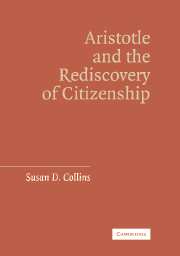Book contents
- Frontmatter
- Contents
- Acknowledgments
- Aristotle and the Rediscovery of Citizenship
- Introduction: The Rediscovery of Citizenship
- 1 Liberal Citizenship and Aristotle's Ethics
- 2 Citizen Virtue and the Longing for the Noble
- 3 Justice as a Virtue
- 4 Prudence, the Good Citizen, and the Good Life
- 5 Citizenship and the Limits of Law
- 6 Political Wit and Enlightenment
- Conclusion: Aristotle and the Rediscovery of Citizenship
- Bibliography
- Index
1 - Liberal Citizenship and Aristotle's Ethics
Published online by Cambridge University Press: 17 July 2009
- Frontmatter
- Contents
- Acknowledgments
- Aristotle and the Rediscovery of Citizenship
- Introduction: The Rediscovery of Citizenship
- 1 Liberal Citizenship and Aristotle's Ethics
- 2 Citizen Virtue and the Longing for the Noble
- 3 Justice as a Virtue
- 4 Prudence, the Good Citizen, and the Good Life
- 5 Citizenship and the Limits of Law
- 6 Political Wit and Enlightenment
- Conclusion: Aristotle and the Rediscovery of Citizenship
- Bibliography
- Index
Summary
The current debate about liberal citizenship is marked by a pervasive doubt about such fundamental liberal principles as the primacy of the individual, the neutrality of the contractual state, and the priority and universality of rights. To be sure, there have been past disputes about the political and legal terms of citizenship. In the American case, for example, disputes have ranged from the arguments concerning naturalization at the Constitutional Convention to the battle over voting rights to more recent discussions of immigration. But these past disagreements also reflected a more fundamental consensus that “the first mark of American citizenship,” and of liberal citizenship in general, is the “political equality of rights,” and that defining citizenship largely entailed working out the full meaning of these terms. Since the current debate follows from critiques of liberal thought itself, however, we now confront fundamental questions concerning the very ideals and principles that have traditionally undergirded discussions of citizenship.
In providing an overview of these critiques and the ways in which scholars have subsequently sought to reconceive liberal citizenship, I seek not to recapitulate this ongoing debate but to describe the general context within which it has arisen and to draw out problems that provide a bridge to Aristotle's thought. I begin from two developments. First, in the last decades of the twentieth century, a growing perception that liberal thought, and the Enlightenment project in general, failed to make good on its promise to ground morality in a rational and nonteleological framework raised serious doubts about liberalism's capacity to defend its own moral and political principles.
- Type
- Chapter
- Information
- Aristotle and the Rediscovery of Citizenship , pp. 6 - 46Publisher: Cambridge University PressPrint publication year: 2006
- 1
- Cited by



